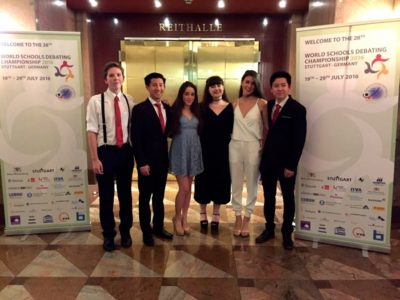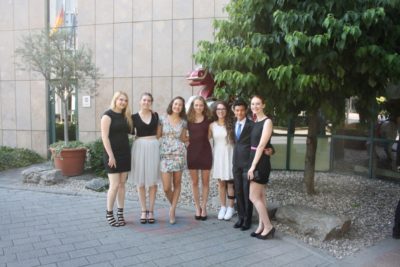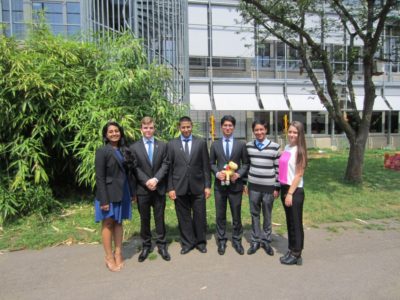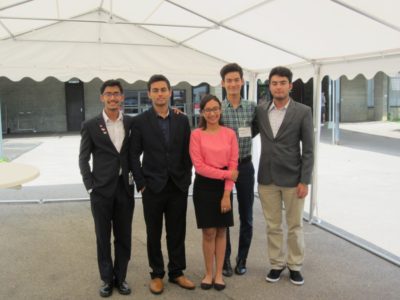Debaters at the WSDC – Part 2
On the 19th-29th Juli the World Schools Debating Championships take place in and around Stuttgart, Germany (an article about the WSDC 2016 can be found here). The Achte Minute was visiting the event and we’ve interviewed some of the participating debaters from all around the world. Because of the large number of interviews the first part of this Mittwochs-Feature was already published yesterday.
In this part you can find the interviews with:
Naz Gocek, Branksome Hall – Canada
Barbara Krumpholz, Europäisches Gymnasium Bertha-von-Suttner – Germany
Thomas Murphy, Dubai College – United Arabic Emirates
Abhaya Gauchan, Ratobangala School – Nepal
Naz Gocek, Branksome Hall – Canada

Team Canada and coach – © Team Canada
Achte Minute: Hello, Naz! How old are you?
Naz: I’m 18.
Achte Minute: How long have you been into debating by now?
Naz: Four years.
Achte Minute: Did you only debate at WSD or somewhere else, too?
Naz: I did a lot of different formats, I’ve done Canadian National Debate format, I’ve done BPS. I started WSDC when I was seventeen.
Achte Minute: How is WSD organized in your country? How has your team been selected?
Naz: Canada does a great job in organizing the team selection. There is a process with some stages. The first one is to send a written application to your province’s debate organizers. Based on that, if they are interested in you, there will be the provincial tryout with about 6 people, for me this was Ontario. If you did well in the provincial tryout you will get to the national tryout. There are 24 people at the national tryout. You can also apply there directly via the Canadian National Debate Foundation, but that’s less common. From those 24 they select the members on the development team, from there, towards the end of the year, they select the five participants.
Achte Minute: Some of the motions were announced months ago. How did your team prepare for them?
Naz: We divided up the work based on people’s interested. For example I am very interested in economics, so I took those. After that we came together, revised, worked on it again and so on. We also practiced in debating them.
Achte Minute: How are you spending your time in the one hour preparation time you have for the impromptu debates?
Naz: We usually take some time to brainstorm silently, after that we come together and ask each other questions about the motion, discuss it. Then, after about half an hour, we split up, the constructive speakers will work on their speeches and the rest on the clash.
Achte Minute: How do you decide who speaks in which round?
Naz: Honestly it changes. Sometimes it’s based on topics, sometimes it’s depending on positions. Alex for example is excellent as first speaker, so he speaks first.
Achte Minute: What are you planning to do after school?
Naz: I’m headed to Stanford University, which I’m very excited about. I think I’ll study political science, economics, international relations, all things connected to debating somehow.
Achte Minute: What has debating taught you?
Naz: The importance of cooperation and confidence. And also the importance of listening to others.
Achte Minute: Thank you, Naz! Good luck at the tournament!
Barbara Krumpholz, Europäisches Gymnasium Bertha-von-Suttner – Germany

Team Germany with coach and team manager – © Team Germany
Achte Minute: Hi Barbara! How old are you?
Barbara: 17
Achte Minute: How long have you been into debating by now?
Barbara: I’ve been into debating since 6th grade, but you have to consider that the debating league in Berlin only meets half a year and if you win 3 debates you already are the winner, so it’s not much.
Achte Minute: Did you only debate at WSD or somewhere else, too?
Barbara: No, only World Schools.
Achte Minute: Some of the motions were announced months ago. How did your team prepare for them?
Barbara: We heard of them whilst we were in Slovenia at the Debate Academy, so during the tournament we already prepared two of the motions and debated them against Switzerland and Slovenia already. After that we used Google Docs to build cases before we met in Stuttgart again.
Achte Minute: How are you spending your time in the one hour preparation time you have for the impromptu debates?
Barbara: First we clarify what the motion means. Then, before brainstorming, we try to find the important issue. After that we take time to brainstorm and when that’s done we prioritize them, after important groups for example. Then we prepare speeches. We often have two people prepare the first speech.
Achte Minute: How do you decide who speaks in which round?
Barbara: During Slovenia we found out who fits which motion. For each debate we go after who has the most knowledge about certain topics, so we take the people who are most comfortable with a motion.
Achte Minute: What are you planning to do after school?
Barbara: I still have one year to go, so I try to find a gap year organization, because I either would like to do a volunteer year in South America or the Middle East. But if I really find the perfect subject to study until then, I might start studying directly. It could be politics, law or medicine.
Achte Minute: What has debating taught you?
Barbara: Much. Firstly, I’m now carefully thinking about opinions. That’s because you often hear a motion with a clear own opinion, which changes during the debate.
Achte Minute: Thank your for the interview – good luck at the WSDC!
Thomas Murphy, Dubai College – United Arabic Emirates

Team United Arabic Emirates and coach – © Lennart Lokstein
Achte Minute: Hi Thomas – how old are you?
Thomas: I’m 18. You can call me Tom.
Achte Minute: Alright. How long have you been into debating by now?
Tom: Four years.
Achte Minute: Did you only debate at WSD or somewhere else, too?
Tom: I’ve done other formats including BPS, also at school.
Achte Minute: How is WSD organized in your country? How has your team been selected?
Tom: Basically we have a central commitee who organizes a two day preliminary selection. From that, 20 people are selected and then they have a series of training sessions and eventually the team is selected down to five people. Around 300 people come to the preliminary selection.
Achte Minute: Some of the motions were announced months ago. How did your team prepare for them?
Tom: Our coaches allocated 3 people to each motion. We worked on the cases first, because our coaches were in different countries. Once we had the first write and check everyone started going through it.
Achte Minute: How are you spending your time in the one hour preparation time you have for the impromptu debates?
Tom: We start brainstorming, then we feedback to the group. We establish our burdens, what we have to proof in the debate, what the cental issue of the debate is. Then the prep leader starts gathering the central arguments and we structure them into individual speeches.
Achte Minute: How do you decide who speaks in which round?
Tom: Our coaches decide this.
Achte Minute: What are you planning to do after school?
Tom: I’m going to study at a university, probably history. After that I’m possibly going to work in diplomacy or law.
Achte Minute: What has debating taught you?
Tom: I think the value lies in seeing both sides and being able to accept way more perspectives.
Achte Minute: Thank you for your time, Tom, and good luck at the tournament!
Abhaya Gauchan, Ratobangala School – Nepal

Team Nepal – © Lennart Lokstein
Achte Minute: Hello, Abhaya! How old are you?
Abhaya: 17
Achte Minute: How long have you been into debating by now?
Abhaya: Two years in WSD style but informally for three years.
Achte Minute: Did you only debate at WSD or somewhere else, too?
Abhaya: One year, but just generally.
Achte Minute: How is WSD organized in your country? How has your team been selected?
Abhaya: The national tournaments aren’t really large, we have like 20-30 teams taking part. Apart from that we have a screening test to find who’s best fit to come.
Achte Minute: Some of the motions were announced months ago. How did your team prepare for them?
Abhaya: What we did was primarly having everyone work on their part, then come together and let more experienced debaters have a look on that. We also have debaters research the topics and debated against them to see if we have missed anything.
Achte Minute: How are you spending your time in the one hour preparation time you have for the impromptu debates?
Abhaya: We are isolated from everybody else, you have to do everything alone. You aren’t allowed to have internet access, but you can use printed stuff you have with you. What we do is writing everything we think relevant down in the first 10 minutes, then we share it and once we’ve shared it one writes it down. After that we prioritize arguments and structure them for speeches.
Achte Minute: How do you decide who speaks in which round?
Abhaya: We have a quite diverse team, Agash for example is rather a science student at high school and I’m more into social sciences. So whoever is more informed and can understand the debate more holistically speaks.
Achte Minute: What are you planning to do after school?
Abhaya: I want to study political science or a subject within that, like diplomacy or international relations.
Achte Minute: What has debating taught you?
Abhaya: Basically you see all things in new perspectives. Even everyday things that we take for granted. More specifically what debating taught me is analyzing things better and having a more distinctive view of the world.
Achte Minute: Thank you for your time and good luck!
Interviewing the debaters for the Achte Minute was Lennart Lokstein. For more information about the World Schools Debating Championships 2016 in Stuttgart, visit www.wsdcgermany2016.com. All debates are free of charge and open to the public.
lok./
Das Mittwochs-Feature: Every Wednesday at 10.00 a.m. the Mittwochs-Feature features some idea, interview or book regarding debate – usually in German, sometimes in English, sometimes both. If you would like to start a debate please mail us your idea to team [at] achteminute [dot] de.






